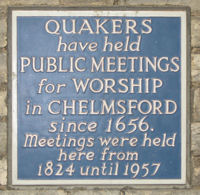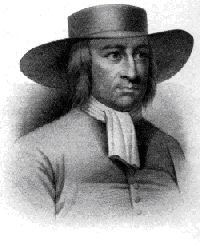
Plaque on the Anne Knight Building in Chelmsford, opposite the railway station.
The Beginnings
Quakers in mid-Essex have been practicing their distinctive form of worship for over three hundred and fifty years.
Essex was a stronghold of Puritanism before the days of Quakers, and in the Essex Sessions Records there are many records of instances of individual revolt.
For instance, in 1642, Bridget, wife of Walter Mildmay of Great Baddow, refused the Holy Sacrement and also refused to go to hear Divine Service; she was convicted. In 1644 many more were convicted for not attending church, at Moulsham, Great Baddow and Springfield. Again in 1644, but on the question of peace, Humphrey Sargent, of Pleshey, a yeoman, was accused of being one of those who mutinously and riotously assembled at Guildhall (in London) about a petition for peace, and to have spoken words against the Parliament and Common Councilmen of London. So the seeds of religious and secular unrest were sown for Quakers, and others, to harvest.
The Quaker movement was founded around 1652 in the north-west of England, but quickly spread as travelling preachers carried the Quaker message. A young man, James Parnell, became a convert to Quakerism, and in 1655, aged just 18, came to Essex. The north of the county had a tradition of radical religious activity, having been a centre of Lollardy and general dissatisfaction with the Church, and people were searching for new directions. James preached in Halstead, Stebbing, Felstead, Coggeshall and Witham. Many were convinced, but there was also much opposition, especially from the Church and judiciary.
In July 1655 James was arrested after speaking to the Church congregation in Coggeshall, and taken to Colchester Castle. Walked to Chelmsford Assizes in chains for trial, he took the opportunity of preaching to people as he was escorted through the town and from the steps of the Assizes. He was found innocent of the charges against him, but convicted of contempt of court for refusing to remove his hat in court, and fined £40. He refused to pay the fine, and so was marched back to Colchester Castle to be imprisoned. Here he died eight months later, in April 1656, after much mistreatment and a fatal fall whilst climbing in a weakened condition a rope to his elevated cell.
The message that James Parnell gave must have been a powerful one, for Quaker Meetings for Worship were being held in Chelmsford in 1656.

George Fox, a founding father of Quakerism, who converted James Parnell in Carlisle goal, where Fox was imprisoned.
Key to the endurance of the Quaker movement has been the disciplined network created by George Fox in those early days. At the grass roots were the groups of people who met each week for worship. These constituted the Preparatory Meetings. Preparatory Meetings were geographically grouped into Monthly Meetings. At the Monthly Meetings delegates from each of the Preparatory Meetings would discuss financial and spiritual matters relating to their Preparatory Meetings, and agree what actions needed taking, or refer the matter to a higher level. Monthly Meetings were in turn geographically grouped into county Quarterly Meetings at which delegates from the Monthly Meetings would discuss matters that were felt in need of broader airing. Matters could be brought from Quarterly Meetings to the Yearly Meeting for discussion and discernment. Quakers were, and still are, a bottom-up organisation with matters of concern being promulgated upwards until they are resolved at the appropriate level.
This structure is largely intact today, although the nomenclature has changed in the last few years. The grass roots meetings are now known as Local Meetings, the Monthly Meetings as Area Meetings; and the Quarterly Meetings have become Regional Gatherings but shorn of their business functions. Yearly Meeting continues unchanged.
The Quaker 'Discipline' has been an enduring (and changing) feature - a foundation - of Quaker life. 'Discipline' is not now a popular word, but in the seventeenth century it was rooted in ideas of learning and discipleship, and for Quakers consists for the most part of advice and counsel. One of the earliest copies of Quaker 'Discipline' is a letter penned in 1656 from Balby Meeting, setting out a framework for living a Quakerly life at that time. A summary can be found here
Fox constantly travelled the country advising his followers, and in September 1667 he arrived in Felsted to discuss Quaker organisation in Essex. Witham Monthly Meeting was set up, comprising meetings at Heybridge, Steeple, Cressing, Witham, Baddow and Fuller Street; but by the start of the 18th century this had changed to Witham, Maldon, Chelmsford, Cressing, Billericay and Fuller Street. Now known as Mid-Essex Area Meeting, the group of Local Quaker Meetings - Chelmsford, Maldon, Billericay and Brentwood - hold and administer their assets - money, land and buildings - collectively.
From the earliest days Quakers kept written minutes of their meetings to discuss financial and spiritual matters. They also kept a record of births, marriages and deaths in the Meetings. The minutes of Witham Monthly Meeting commence in 1672, and in Essex Record Office there are volumes of minutes covering the years 1672 to 1948 which can be accessed by the general public.
Each Local Meeting appoints elders who have responsibility for the spiritual life of their meeting. It falls to them to help erring members see their faults. It would seem that at the start of the 18th century, the moral standards of some mid-Essex Quakers was low. In 1703 it is recorded that Chelmsford Local Meeting deputed several elders 'to go to John Bucknell and his wife to discourse them about some disorderly walking' (the phrase "disorderly walking" implies straying from the path required by Quaker discipline, and places the member in imminent danger of disownment); and in 1705 the elders were 'to go to Matthew Joslin's to visit him and his wife, and desire the reasons why they do not keep more constantly to meetings'.Even worse was the case of Thomas Turner, who was the subject of a lengthy minute which ends 'We desire the Lord may give him repentence and that he may witness reconciliation with Him, and until these manifest tokens be demonstrated and seen by Him, we do deny him to be one of us'. Three years later we find that he gave 6d to Monthly Meeting with the resulting minute: 'From this meeting was returned 6d which Thomas Turner laid down to the collection, this meeting not having freedome to receive it'!
